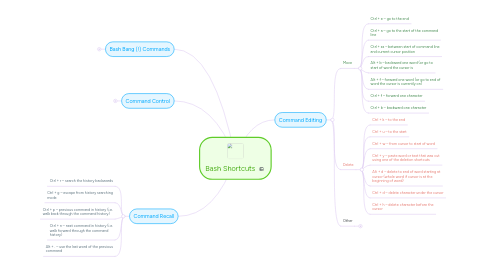
1. Command Recall
1.1. Ctrl + r – search the history backwards
1.2. Ctrl + g – escape from history searching mode
1.3. Ctrl + p – previous command in history (i.e. walk back through the command history)
1.4. Ctrl + n – next command in history (i.e. walk forward through the command history)
1.5. Alt + . – use the last word of the previous command
2. Bash Bang (!) Commands
2.1. !! – run last command
2.2. !blah – run the most recent command that starts with ‘blah’ (e.g. !ls)
2.3. !blah:p – print out the command that !blah would run (also adds it as the latest command in the command history)
2.4. !$ – the last word of the previous command (same as Alt + .)
2.5. !$:p – print out the word that !$ would substitute
2.6. !* – the previous command except for the last word (e.g. if you type ‘find some_file.txt /‘, then !* would give you ‘find some_file.txt‘)
2.7. !*:p – print out what !* would substitute
3. Command Control
3.1. Ctrl + l – clear the screen
3.2. Ctrl + s – stops the output to the screen (for long running verbose command)
3.3. Ctrl + q – allow output to the screen (if previously stopped using command above)
3.4. Ctrl + c – terminate the command
3.5. Ctrl + z – suspend/stop the command
4. Command Editing
4.1. Move
4.1.1. Ctrl + e – go to the end
4.1.2. Ctrl + a – go to the start of the command line
4.1.3. Ctrl + xx – between start of command line and current cursor position
4.1.4. Alt + b – backward one word (or go to start of word the cursor is
4.1.5. Alt + f – forward one word (or go to end of word the cursor is currently on)
4.1.6. Ctrl + f – forward one character
4.1.7. Ctrl + b – backward one character
4.2. Delete
4.2.1. Ctrl + k – to the end
4.2.2. Ctrl + u – to the start
4.2.3. Ctrl + w – from cursor to start of word
4.2.4. Ctrl + y – paste word or text that was cut using one of the deletion shortcuts
4.2.5. Alt + d – delete to end of word starting at cursor (whole word if cursor is at the beginning of word)
4.2.6. Ctrl + d – delete character under the cursor
4.2.7. Ctrl + h – delete character before the cursor
4.3. Other
4.3.1. Alt + u – make uppercase from cursor to end of word
4.3.2. Alt + l – make lowercase from cursor to end of word
4.3.3. Alt + t – swap current word with previous
4.3.4. Ctrl + t – swap character under cursor with the previous one
4.3.5. Alt + c – capitalize to end of word starting at cursor (whole word if cursor is at the beginning of word)

